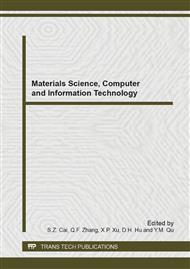[1]
Yu Jin-xia, Wang Lu. Unknown environment of mobile robot self-localization techniques [M]. Beijing: Electronic Industry Press, 2011: 1-5.
Google Scholar
[2]
Li Xiao-lei, Shao Zhi-jiang, Qian Ji-xin. An optimizing method based on autonomous animates: fish-swarm algorithm [J] . Systems Engineering-Theory&Practice, 2002, 22(11): 32-38.
Google Scholar
[3]
Qian Ji-xin, Li Xiao-lei. Studies on artificial fish swarm optimization algorithm based on decomposition and coordination techniques [J]. Journal of Circuits and Systems, 2003, 8(1): 1-6.
Google Scholar
[4]
Lu Fei, Li Xiao-lei, Tian Guo-hui, et al. Applications of artificial fish school algorithm in combinatorial optimization problems [J]. Journal of Shandong University (Engineering Science), 2004, 34(5): 64-67.
Google Scholar
[5]
Li Xiao-lei, Xue Yun-can, Lu Fei, et al. Parameter estimation method based-on artificial fish school algorithm[J]. Journal of Shandong University( Engineering Science) , 2004, 34(3): 84-87.
Google Scholar
[6]
Li Xiao-lei, Feng Shao-hui, Qian Ji-xin, et al. Parameter tuning method of robust PID controller based on artificial fish choolalgorit him [J]. Information and Control, 2004, 33(1) : 112-115.
Google Scholar
[7]
Ma Jian-wei, Zhang Guo-li, Xie Hong, et al. Optimization of feed forward neural networks based on artificial fish swarm algorithm[J]. Computer Applications, 2004, 24(10) : 21-23.
Google Scholar
[8]
Tang Jian-dong, Xiong xin-yin, Wu Yao-wu. Optimization algorithm based on artificial fish Reactive Power[J]. Relays, 2004, 32(19): 9-12.
Google Scholar
[9]
Ma Jian-wei, Zhang Guo-li. Artificial neural networks in fish power system short-term load forecasting[J], Grid Technology, 2005, 29(11): 36-39.
Google Scholar
[10]
Zhang Ming-yan, Yuan Dong-feng. AFSA and its application[M]. Beijing: Science Press, 2012, 57-59.
Google Scholar


